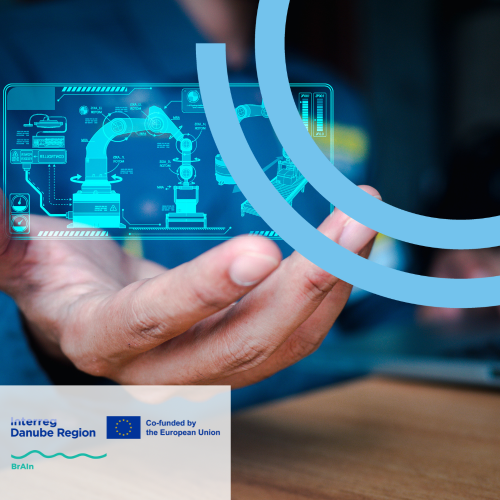Executive MBA: Innovation, Digitalisation & Entrepreneurship
Note for groups: If you are buying this product for multiple participants, you will be able to assign licenses after completing the order. Please select “Group” and the number of seats you require.
At a glance:
- Final Degree: Executive Master of Business Administration (EMBA) | Innovation, Digitalisation & Entrepreneurship
- Duration: 3 semesters + Master’s Thesis
- Language: English
- Programme Start: annually in October
With the Executive MBA Innovation, Digitalisation, and Entrepreneurship you learn how to “read” the digital roadmap and how to incorporate creative solutions. You develop the appropriate skills, techniques and drive to initiate and implement dynamic innovation as well as start-up projects.
Programme start: annually in October
Key learnings
- Know-how about navigating your company or organisation
- Decision-making competence in management and new technologies
- Empowerment of your leadership personality
- Know-how and practical tools for developing innovation strategies in order to unfold the potential of new technologies at all levels
- Additional qualifications in our electives Accelerator & Innovation Projects and Field Study to European hotspots
Final Degree: Executive Master of Business Administration (EMBA) | Innovation, Digitalisation & Entrepreneurship
ECTS credits: 92
Duration: 3 semesters + Master’s Thesis
Structure: Part-time, blocked in modules
Language: English
Admission Requirements: First academic degree; 3 years of work experience; admission interview
Locations: TU Wien, surrounding area of Vienna
Academic Director: Prof. Sabine T. Köszegi
Next Programme Start: annually in October
Leadership & Organisational Behaviour | 9 days (3×3 days)
You will learn
- to explain the basics of behaviour and the role of leadership in organisations.
- differentiate between different leadership styles.
- to analyse the behaviour of employees and teams in organisations as well as of organisations.
- to develop starting points for change initiatives.
- to set clear priorities in your decision-making processes to influence your employees.
- to describe group processes and to design them.
- to define the development dynamics of organisations on a structural, processual and cultural level and to influence transformation processes through the methods learned.
Management & Technology Essentials | 15 days
In the Base Camp around the topics of “Management & Technology”, you will deepen your knowledge in the areas of “Finance, Accounting & Economics”, “Managing Technologies” and “Strategy & Marketing”.
Your key learnings in the area of “Finance, Accounting & Economics”
- to explain the basic aspects of internal and external corporate accounting, to apply them independently in the practical working environment and to use them for business decisions.
- to solve practical financing and valuation problems by applying basic financial principles.
- discuss macroeconomic relationships and current economic policy measures, apply central economic theories and concepts, and analyse the consequences of individual decisions in a market economy context
Your key learnings in “Managing Technologies”
- the fundamental aspects of data science and technology management
- to select appropriate methods for data collection, apply suitable estimation procedures, and analyse the results of a routine sample survey.
- describe basic concepts of probability and statistics and apply them to analyse simple data sets.
- assess the impact of big data on businesses and how the analysis of (big and heterogeneous) data can be used in your working environment
- understand the potential applications of new technologies from a management perspective
- present new technologies and assess what influence they have on your work environment and how they can be used in the respective context.
- present the basics of innovation processes on a company level, identify and apply important tools, models and methods of innovation management and develop innovation strategies.
Your key learnings in the area of “Marketing & Strategy”
- to discuss the core topics of marketing and consumer behaviour and to apply them in practice to specific situations
- to create specific marketing analyses and strategic marketing plans
- to explain the complexity of global business processes in a dynamic and competitive environment.
- apply knowledge from various business disciplines, both individually and collectively to solve practical problems.
- learn how to strategically manage internationally operating companies using performance indicators and financial ratios.
Master Class Innovation, Digitalisation & Entrepreneurship | 15 days
This Master Class offers specializations in various topics: Entrepreneurial Leadership & Technology, Sources of Innovation, Innovation Marketing, Innovation Strategy & Business Development, Organising Innovation, Innovation Growth & Funding Organising Innovation.
Your key learnings in Entrepreneurial Leadership & Technology and Business Development
- to analyse and describe critical aspects of company formation as well as environmental influences and trends.
- to identify relevant decision factors for the implementation of start-up and innovation decisions in large international technology companies as well as in start-up companies on the basis of real case studies.
- to apply creative problem-solving techniques and manage ambiguity and complexity in a business context.
- to conduct potential analyses
- to develop global business plans
- to develop financing plans to secure the necessary venture capital for start-ups.
Your key learnings in Organising Innovation
- to describe the advantages and disadvantages of different organisational architectures and to critically analyse organisational challenges of innovation processes.
- to define the interfaces of innovation processes to other core functions of business administration (e.g. strategy, marketing).
- to solve key organisational challenges to innovation using appropriate problem-solving skills, methods, and approaches.
- to structure ideas and presentations, and to research, analyse, and summarize relevant information in a meaningful way.
- to apply your teamwork skills
- to apply your problem and conflict resolution methods and strategies.
Your key learnings in Innovation Management
- to describe different market research approaches and different sources of innovation within and outside organisations, and different innovation strategies, and define the challenges of commercializing new technologies.
- to describe approaches for the successful introduction and diffusion of innovations and apply them in your work environment.
- to identify the main approaches and related methods for finding sources of innovation and their advantages and disadvantages.
- to generate and apply innovation-related knowledge.
- to evaluate your company’s innovation strategy, propose improvements and become a proactive innovation promoter in your organisation.
- to apply the central instruments and concepts of strategic innovation management.
- to analyse market situations and design appropriate go-to-market activities and marketing action plans.
- to conduct structured analyses and to summarize and present them
Insight: Negotiations | 6 days
You will learn the essentials of successful negotiation:
- develop an effective and appropriate mindset to conflict situations
- Structure the negotiation process
- apply concepts of strategy and tactics effectively
- handle difficult situations with confidence
- build solid business relationships and create future opportunities
Master’s thesis
In your Master’s thesis, you will work independently on a problem by applying scientific methods in a topic area of your own choice. In most cases, it is a question with practical relevance to your own working environment.
This MBA is the right choice if you aim to
- start or grow a company,
- become a proactive innovation lead in your organisation,
- understand your role as an entrepreneur or intrapreneur or
- want to proactively effect change in your organisation.
The MBA particularly addresses professionals with a technical or scientific background from the following areas:
- (High) tech companies/organisations and businesses in different industries and operation fields
- Non-profit organisations and public institutions
- SMEs.
Next programme start: October 2025
This programme is designed for professionals and allows you to balance your job, family, and MBA. It allows you to work whilst developing new entrepreneurial skills, knowledge and competencies. The programme runs for 18 months and classes are taught in a block format usually from Thursday-Saturday or Friday-Sunday, usually about every 4 weeks. In total, the programme consists of 45 teaching days.
Didactics
All modules are divided into a preparation phase, the in-class time and a follow-up phase.
Individual preparation phase
The individual preparation phase for a module includes pre-readings, preparation of case studies, preparation of presentations, essays, etc.
In-class time
The MBA classes use a wide variety of teaching and learning methods. These range from interactive case studies, simulations and calculations to classical presentations, but also include discussions, group dynamic exercises and reflections. Modules take place in full-day blocks and usually last between 3-5 days.
Individual follow-up phase
The individual follow-up phase is intended to consolidate or apply what has been learned in class. Depending on the module, the follow-up phase may include writing assignments, case studies, reflections or exams.
Want to know more?
Please contact us for further information.





